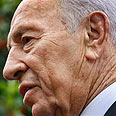
Peres. 'Primary challenge is Iranian ayatollahs'
Photo: AP
Peres: Obama's journey a unique opportunity
In article published by Times newspaper several hours before US president's historic speech in Cairo, Israeli president says Obama's visit to region 'reflects both the need for an historic change in the Middle East and a unique chance of achieving it'. It's time for navigators to decisively take helm, he adds
"The passengers are ready. The ship is waiting. It is time for the navigators to decisively take the helm," President Shimon Peres
wrote in an article published Thursday by British newspaper Times, just several hours before US President Barack Obama's historic speech
to the Arab world from Cairo.
The kings of Jordan
and Saudi Arabia "are right in seeing both the proper destination and the surest path for its realization. With the support of the leadership in Egypt, it seems the time is ripe to end the Israeli-Arab conflict once and for all."
"President Obama's journey to Saudi Arabia and Egypt could be an opportunity. It reflects both the need for an historic change in the Middle East and a unique chance of achieving it," Peres wrote.
Opinion
Nahum Barnea
US president’s lofty objectives would be difficult to secure in just four years
Addressing Iran, Peres wrote, "Many Arab leaders perceive hegemony-seeking Iran as a threat to their existence and identity. For them, the primary challenge is not Israel but the Iranian ayatollahs who seek domination over the Middle East, using terror and threats of unconventional weapons. Israel is increasingly viewed as a part of the new path for a regional solution. A regional security framework will also help Israel to secure its paramount interest of security."
Various ideas are being discussed, Peres said. "One significant concept is King Abdullah of Saudi Arabia's peace initiative which was adopted by the Arab League in Beirut. Much wisdom lies also in King Abdullah of Jordan's proposal of a '57-state solution' to the Arab-Israeli conflict.
"Achieving this historic goal calls for a twin-track approach. It requires bilateral negotiations between Israel and each of its neighbors - the Palestinians, Syria and Lebanon. And in tandem with this, a regional process of normalization of relations between Israel and the Arab states. Such diplomatic architecture may introduce a win-win strategy for all parties."
'Unforeseen events decide fate'
In the article, the president also chose to look back at the past and at the historic efforts to strike peace between Israel and its neighbors. "Looking back," he wrote, "I confess that well-formulated peace plans are not enough on their own. Something else is often required. Unforeseen events occasionally decide the fate of war and peace - like a whirling wind they can uproot long-held, stubborn mindsets."For instance, if the Israeli-Egyptian negotiations had been guided only by lawyers, I wonder if peace would have been reached so quickly. What brought about the Egyptian-Israeli peace treaty, signed in 1979, was a journey of less than an hour - the time it took Anwar Sadat to fly from Cairo to Jerusalem. This hour changed the course of history in the Middle East."
Peres did not refer in his article to controversial issues, like the ongoing settlement construction and the evacuation of illegal West Bank outposts. In addition, he did not mention Prime Minister Benjamin Netanyahu and settled for presenting his own vision for regional peace.
"A regional peace will also address vital challenges such as water shortages, environmental pollution and poverty. These problems seem national but they are regional - and so are their solutions," he wrote.















